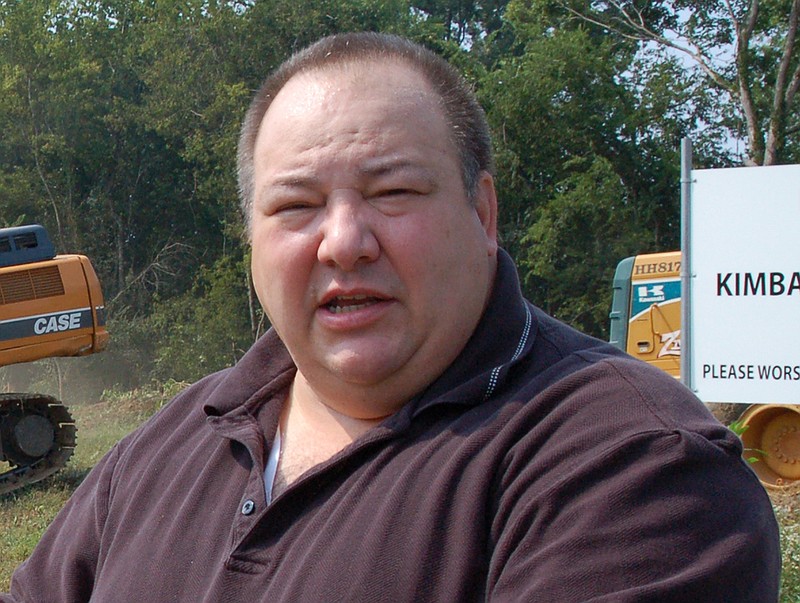On an April night about six years ago, a Winchester, Tenn., police detective was monitoring the Internet and noticed something odd. Somebody from an IP address in South Pittsburg was downloading stills of child pornography.
Also a task force officer for a coalition designed to curb online sexual predators, Chris Layne subpoenaed records from the Internet service provider. He traced the downloads to an IP address that belonged to an "Emily" at a Marion County address. He consulted with the Tennessee Bureau of Investigation about a search warrant. He prepared an affidavit, got the 12th District Attorney General's Office to sign off, and landed a search warrant.
And on April 26, 2010, accompanied by Kenneth Mark Wilson, of the Tennessee Bureau of Investigation, and Sgt. Danny Mantooth, of the Winchester Police Department, Layne executed that warrant and found a desktop computer and a laptop at the address, records show.
They also found David Hoschar, then a pastor of Kimball Baptist Church. They interviewed him, his two children, his wife. Nobody knew anything about the pornography.
So the agents shipped the equipment to TBI's crime lab, which said neither computer contained child pornography. But when Layne and Wilson presented the case to a grand jury in December 2010, they knew that information but never shared it, according to Hoschar's defense. The TBI could not be reached for comment Thursday.
In fact, the Hoschars' defense has argued Layne and Wilson didn't present several pieces of crucial information:
They never mentioned that someone else in the vicinity could have downloaded the pornography because the Hoschars' router was not protected. They never clarified that the second laptop wasn't around during the search because the Hoschars' daughter took it when she moved out in 2009. And they never shared that a TBI report ruled out either computer being scrubbed clean of pornography.
But a U.S. Court of Appeals for the Sixth Circuit ruling released earlier this week said Layne and Wilson were protected by "absolute immunity" during their contested grand jury testimony in 2010. Absolute immunity means government officials are protected from criminal prosecution as long they acted within the scope of their duties. In this case, the testimony resulted in Hoschar being indicted on one count of sexual exploitation of a minor.
Nearly 18 months later though, in 2012, Hoschar's criminal case was dismissed. But in 2013, Hoschar turned around and filed a civil lawsuit in the Eastern District of Tennessee, saying he was maliciously prosecuted, falsely imprisoned and embarrassed. He asked for about $1.1 million, but U.S. District Court Judge Curtis Collier sided with the law enforcement's summary judgment for dismissal. So Hoschar appealed it up to the next court.
"It is unfortunate that Layne and Wilson did not provide a more complete and balanced picture to the grand jury," reads the Sixth Circuit ruling, filed Tuesday. But the judge said the circuit had little experience applying common case law to malicious prosecution.
Referencing a different case, the judge wrote: "This court held that even if the defendant police detective misled or gave false testimony before the grand jury, as the plaintiff asserted, the detective had absolute immunity."
The ruling didn't sit with well with Charles Dupree, who has represented Hoschar since the 2013 federal lawsuit. Attempts to reach Hoschar were unsuccessful Thursday.
"I don't like it," Dupree said. "I don't think it makes sense. I don't think that officers should be allowed to lie with impunity. And the other problem is, I don't know how a grand jury would know whether somebody lied or not. They don't really investigate. They just base it on what's presented before them."
In general, prosecutors and law enforcement officers are interconnected throughout the grand jury process. Hermann Walz, a former prosecutor, current defense attorney, and adjunct at the John Jay College of Criminal Justice in New York, described it as series of checks.
"If they really believed it, then police went to the DA's office," Walz said. "That's a second check. When I was a DA, we were skeptical. We wanted to believe, but we wanted to be the devil's advocate. The grand jury is really a safeguard."
Foundationally, the system is pretty good, Walz said. But the grand jury looks for two fairly low-threshold elements: probable cause and reasonable belief that a person was involved in the crime. Furthermore, officers aren't obligated to present a counterargument. They can pick and choose depending on the case.
"The problem is, on cases like this, they should be extra careful about the damage just charging someone," Walz said. "If we're wrong about this, we destroyed him anyway."
Dupree said officers were supposed to meet with a district attorney, though he wasn't sure if it happened in Hoschar's case.
Mike Taylor, the district attorney general for the 12th district, which includes Marion County, said he could not remember which staff member worked on the case. He could not comment on the federal lawsuit or the Sixth Circuit Court's affirmation but discussed the rationale behind absolute immunity.
"As long as I am engaged in my normal duties on a case, I have absolute immunities for obvious reasons," he said. "You could never function if every guy accused of murder turned around to sue you."
Still, following a standard is crucial to ensuring that no one is falsely convicted, said Wayne Rich Jr., a former federal prosecutor in Chattanooga with 33 years of experience.
Rich described his swearing in as a U.S. attorney: "The United States Attorney sat me down and said, 'You know, you have tremendous power. And in exercising the authority to authorize an arrest warrant or authorize the presentation of an indictment to a grand jury, you need to believe the person is guilty beyond any doubt.
"'Because if you believe that person is innocent and he's arrested or indicted, it can ruin his life.'"
Contact staff writer Zack Peterson at zpeterson@timesfreepress.com or 423-757-6347 with story ideas or tips. Follow @zackpeterson918.
